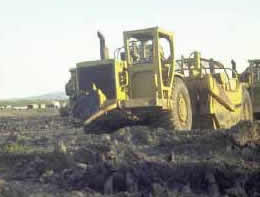|
Monty Python once explained that an argument is a "connected series of statements intended to establish a proposition" ... and "not just the automatic gainsaying of anything the other person says." To which the other person in the skit said, "No it isn't."
Environmentalists are sometimes accused of being too argumentative, or more specifically, too negative. Part of the reason for this perception is that, in general, people who point out problems are necessarily going to sound more negative than people who claim that everything is just fine—even if everything ISN'T just fine.
Nonetheless, just so you don't think we at Grinning Planet spend all of our time being argumentative and negative, here are five things our green brains are thankful for right now:

- We're thankful for the excellent laws that were put in place in the 1970s that have been monumentally helpful in moving the US toward a clean environment, including the National Environmental Policy Act (NEPA), the Endangered Species Act, the Clean Air Act, and the Clean Water Act.
- We're thankful for the fact that sulfur emissions were reduced during the 1990s, thus reducing the problem of acid rain and its effects on trees, waterways, and animals.
- We're thankful for the Montreal Protocol and subsequent international agreements to eliminate the use of CFCs and other ozone-depleting substances, which eat away at the earth's protective ozone layer.
- We're thankful for the overall improvements in water quality for many of our lakes, streams and rivers since the 1970s.
- We're thankful for the planned improvements in regulation of diesel engines and fuels, which will result in a long-overdue clean-up of this useful but dirty power source.
Now, thanks having been given, there are a few caveats:
- Forces are at work to undercut the effectiveness of NEPA and other landmark environmental legislation. Foes of the environmental movement have recognized that the greens have used these tools very effectively, and the anti-greens would be very happy to limit that usefulness in the future. We must not let that happen.
- In its 2003 Draft Report on the Environment, the EPA stated that acidity in precipitation in the eastern US is still at least twice as high as in pre-industrial times. Many forests, streams, and lakes—and the creatures that live in them—are still suffering damage from acid rain. Even though the problem of acid rain has been reduced, sulfur and nitrogen pollution levels must be brought down further.
- In developed countries, manufacture of new CFCs is mostly banned now, but recycled and stockpiled CFCs can still be used, and some black-market CFCs also appear to be getting into the country. Developing nations can still use newly manufactured CFCs until 2010. In the case of some non-CFC ozone-depleting substances, the US has recently fought for a high number of exemptions for certain compounds (notably, the pesticide methyl bromide). Though the international response to the ozone-depletion problem is still an overall good-news story, it's important that we not give in to the forces that would have us go backwards.
- Since the 1970s, about 25% of US waters have been removed from the "endangered" list, but 40% of our lakes, rivers, and
 streams are still classified by EPA as unsafe for fishing or swimming. Recently, protections for non-navigable streams and seasonal wetlands have suffered setbacks. We can and should push for further improvement on water issues. streams are still classified by EPA as unsafe for fishing or swimming. Recently, protections for non-navigable streams and seasonal wetlands have suffered setbacks. We can and should push for further improvement on water issues.
- As for the proposed diesel regulations, this appears to be the only item without a big But. Assuming the regulations are enacted as currently framed, that is. Three cheers for cleaning up diesel!
There are two other things for which we are thankful—without any qualifiers:
- We're thankful for the fact that there are tens of thousands of groups, large and small, in this country and across the globe, working towards preservation of our wonderful planet.
- We're thankful for the fact that so many of you out there care about the environment and are willing to adjust your behavior to reduce your use of energy, toxic chemicals, and resources in general; are willing to donate time and money to the environmental groups carrying on the fight; and aren't giving up on the need to keep the land, air, and water clean for future generations.
And finally, we're VERY thankful that Aunt Mary decided NOT to make her okra-banana stuffing this year.
|


